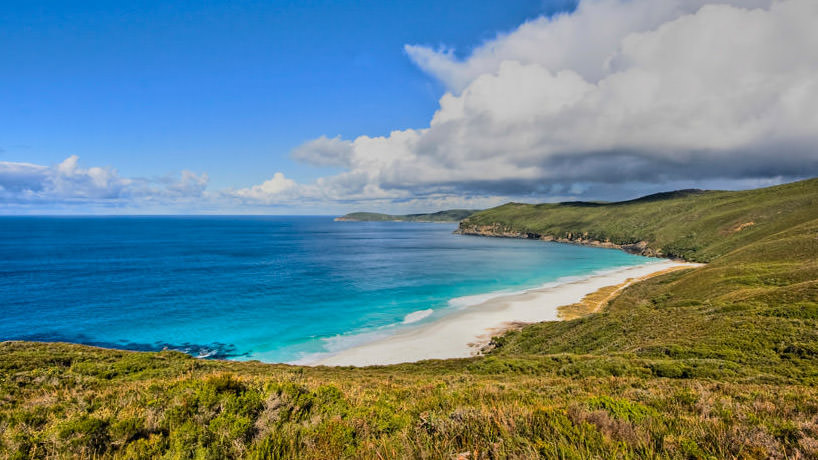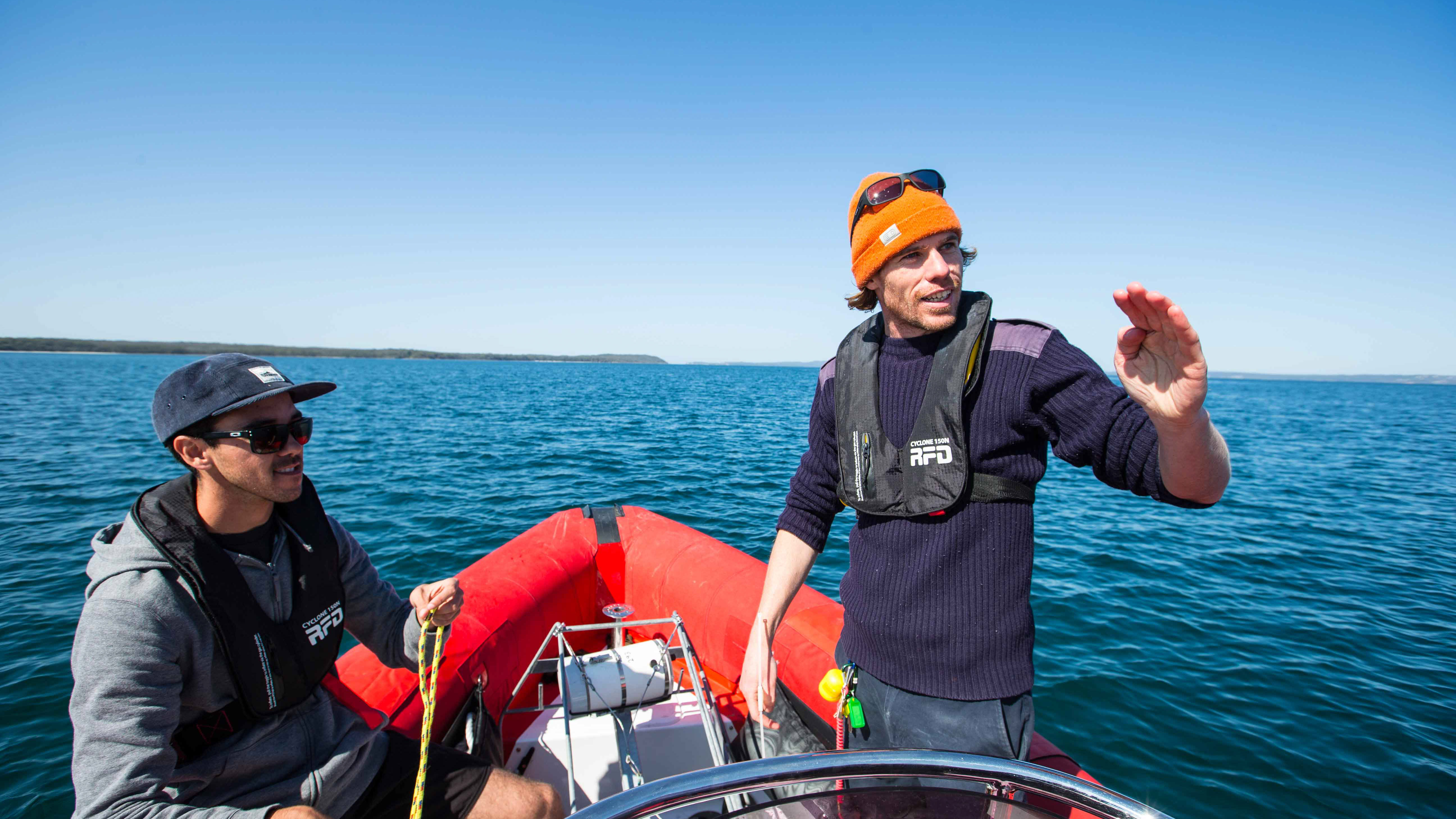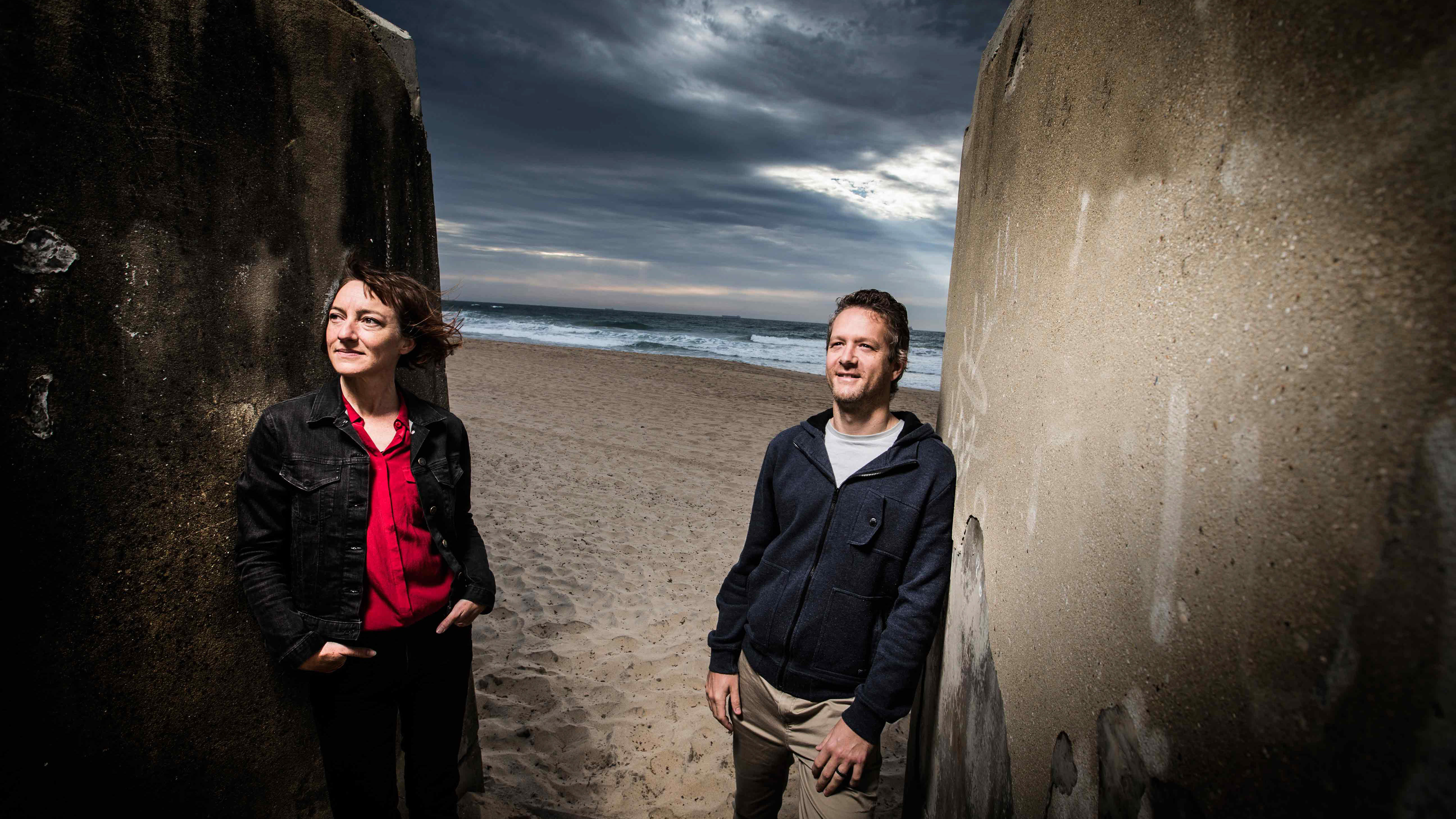Subscribe to The Stand
Want more UOW feature stories delivered to your inbox?
The chances of falling victim to a shark attack are incredibly slim, yet they represent one of mankind's greatest fears.
The tagline was deceptively simple. "Don't go into the water". And, in the months, years, and decades that followed, audiences heeded the warning. Jaws, the story of a great white shark that terrorises a small coastal community in the fictional American town of Amity Island, created an atmosphere of fear and hysteria among swimmers and ocean users when it was released in 1975.
More than 40 years later, the film's legacy cannot be ignored. It tapped into our primal fear - that of the unknown and unseen - and forever changed the relationship between human and shark. Dr Leah Gibbs, Senior Lecturer in Human Geography at the University of Wollongong, has spent the past four years studying humans' perceptions of sharks and says Jaws must bear some of the blame for the devastating PR campaign that sharks have endured over the past four decades.
"I would say the relationship between humans and sharks is troublesome," Dr Gibbs says. "And without singing that familiar film score myself, I think that particular film really set the context for how we relate to sharks." Let's face it, who hasn't heard those ominous few bars while swimming in the ocean?
"Jaws really set the tone for people’s unfounded terror of sharks."
- Dr Gibbs
"The author of the novel, Peter Benchley, has been quoted over the years saying he's quite horrified that the book he wrote has had such a negative effect."
Dr Gibbs, together with Dr Andrew Warren, both based in UOW's Australian Centre for Cultural and Environmental Research (AUSCCER), has been studying cultural perceptions and policy approaches towards sharks. The research was, in large part, prompted by a spate of shark fatalities that occurred off Western Australia in 2011 and the response amongst both the public and that state's government towards the danger of sharks.
In the past 18 months, the issues have further crystallised on this side of the country, as towns in northern NSW grappled with what seemed to be an increasing presence of sharks in the water and a rise in shark-inflicted injuries. Dr Gibbs and Dr Warren spent time talking with ocean users in WA in the wake of the 2011 attacks and found that humans and sharks are largely able to co-exist without incident.
Of the 557 people they surveyed, close to 70 per cent had encountered a shark or seen a shark while in the ocean. The findings of their work were published in Marine Policy.

Western Australia's stunning beaches have been the sight of a number of shark fatalities in the past few years. Photo credit: Sunova Lifestyle Photography/Flickr
Both Dr Gibbs and Dr Warren say their interest in the area of shark research was fuelled by hysteria that seemed to permeate the media and the general public in the wake of these separate episodes. In WA, in particular, the State Government responded to the perceived increased risk of shark attacks by instituting a catch and kill program as well as the use of baited drumlines - large baited fishing hooks tethered to the sea floor and a floating drum - which were extremely controversial and impacted on not only sharks but other ocean species.
"What's really interesting about this area of research is that we don't know what's behind these reports of increased sightings," Dr Gibbs says, citing the potential contributing factors, including overfishing, shifting ecosystems, and ocean acidification, as "super complex".
"Indeed, there is absolutely no scientific evidence that the key species that are identified as dangerous to people in Australia - white, tiger, and bull sharks - are actually increasing in numbers. There are more helicopters in the air searching for sharks, there are more people on beaches now keeping an eye out for sharks.
"There's all the social media, the increased attention in the regular media, the more attention that is given to sharks, the more it feeds off itself. Maybe 20 years ago, if you saw a shark you might tell the people in your surf club about it, and then that would be the end of it. But now it goes on social media and is heard around the world."

PhD candidates Matt Rees and Lachlan Fetterplace conducting research on the NSW South Coast.
Dr Warren agrees, arguing that the rise in reporting shark sightings and encounters is not backed by research. As a lifelong surfer, he is in the water almost every day and says that while there is anecdotal evidence of increased sightings, they largely originate from vocal minorities of the public.
"Popular culture has played a role in this perception of sharks as threatening," Dr Warren says. "You only have to look at things like Discovery Channel's Shark Week, which I think is one of the most watched television events in the United States. The sheer interest in sharks is quite fascinating.
"From my perspective as a surfer, there is something primordial about not knowing what's around you. You are very vulnerable, and potentially there is a species nearby that could eat you. That's constantly in the back of your mind. I've seen a couple of sharks while surfing so I'm constantly aware of their presence in the water."
Sharks are apex predators and have inhabited our oceans for hundreds of millions of years. They play an essential, and careful, role in balancing the ecosystems of our oceans; the decimation of sharks through decades of overfishing has been shown to have a harmful effect on species further down the food chain. In fact, it has been estimated that close to 100 million sharks are killed by humans each year.
A quarter of shark species are classified as threatened. And how many people in Australia are the victims of shark fatalities? Dr Gibbs says the number is, on average, 1.1 people per year over the past five decades. The sheer disparity between the number of people who use the water - as swimmers, surfers, kayakers, fishers, divers - on a daily basis versus the number of people who are killed in an encounter with a shark suggests that our chances of being nibbled while in the ocean are slim. Yet the facts are constantly eclipsed by our fears of what lies beneath the deep.
It is an anxiety mirrored in their findings, in which surfers were discovered to have a much greater fear of sharks than those who experience the ocean from below the surface.
"Our interviews in WA found there was a difference between ocean users on the surface of the water and ocean users like scuba divers. A lot of it has to do with divers having a better perspective of what's around them, as opposed to a surfer where you don't have very good perspective of what's below you at all times," Dr Warren says.
"It's a matter of not being able to see things before you encounter them. We found scuba divers, in many cases, seek out encounters with sharks. They would go to spots with sharks so they could deliberately encounter them, whereas you would not find any surfers who would do that."
Jaws laid the framework for a world obsessed with sharks, but the appetite has been fed through the bombardment of images in popular culture and Hollywood. Sharknado, anyone? A new film, The Shallows, in which a young surfer is pitted against a great white shark in Mexico, has just been released, claiming to be "Jaws for the next generation".
Yet it peddles in the same myths as the original, perpetuating the notion that sharks are vengeful creatures preying on humans. Combined with a media desperate for shark stories, which are always amongst the most popular stories on any news website, as well as a public ready to capture, like, share, retweet the latest sighting, it's not surprising that our perceptions of the danger posed by sharks has become increasingly distorted.
And who could forget the spectacular live footage of Australian surfer Mick Fanning fighting back against a shark during a surfing competition off the coast of South Africa and living to tell the tale?

Dr Leah Gibbs and Dr Andrew Warren
But it is difficult to stop the rolling tide. For now, Dr Gibbs and Dr Warren have joined forces with Associate Professor Quentin Hanich, an expert in fisheries governance from UOW's Australian National Centre for Ocean Resources and Security, and UOW marine biologists and PhD students Matt Rees and Lachlan Fetterplace, who run their own research group called Fish Thinkers, to rethink shark hazard management along the Illawarra and South Coast.
The project, funded by UOW's Global Challenges Program, is examining the challenge of managing species that are both threatening to and threatened by humans. Lachlan, a marine biologist, says while speculation often runs wild in the aftermath of a shark-related incident, scientists simply do not yet know enough about these creatures to offer an explanation as to why one person is bitten while millions more go unscathed every year.
"The truth is that we still don't know a whole lot about why sharks sometimes bite humans," Lachlan says. "Why do they so rarely do it? And why are there occasionally shark bite clusters? I've heard some of the top scientists who are working on this say that although they have looked at all sorts of factors, such as water temperature, seasons, the impact of El Nino, they are still largely unsure why shark bite clusters occur.
"There are a lot of people working on these questions and more funds than ever have been spent on research so it's possible more answers will come out in the future. But it is entirely possible that we will never really know the causes either."
"These incidents are so rare in the scheme of things that it is difficult to come to grips with any patterns and assess the data statistically."
- Lachlan Fetterplace
Lachlan and fellow PhD student Matt Rees have spent a lot of time studying marine species, including sharks. Lachlan believes ocean users should take simple precautions in the water, but says our chances of coming in to contact with a shark are incredibly rare.
"It no doubt depends on location. I wouldn't recommend swimming around seal colonies when the pups are first entering the waters. Avoid water with low visibility and around river mouths," he says. "On the other hand, there are large numbers of juvenile great white sharks off Port Stephens in NSW at known times of the year, and there have never been any attacks by great whites despite huge numbers of people using the water and visiting the area."
He is quick to dispel the popular belief that surfers, in particular, are prone to shark encounters as they are often mistaken for seals on top of the water. "If sharks thought surfers were seals, it would happen a lot more, which suggests they don't get the two mixed up very often."
Despite the consistent evidence that sharks are not on the hunt for humans, the tension between the two will continue to exist as long as we share the water. In the meantime, the researchers all advocate a measured, educated approach towards these majestic creatures. And a sense of perspective.
If all else fails, there is a simple solution. Don't go in the water.
Photos: Paul Jones